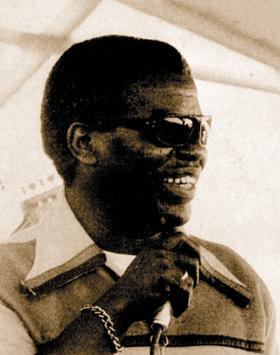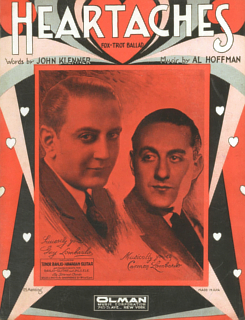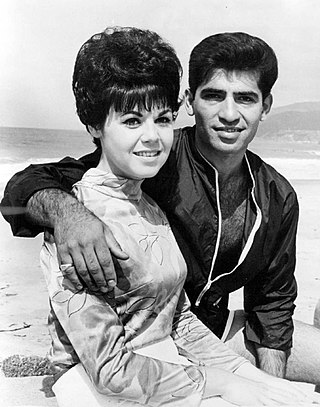Related Research Articles

"That'll Be the Day" is a song written by Buddy Holly and Jerry Allison. It was first recorded by Buddy Holly and the Three Tunes in 1956 and was re-recorded in 1957 by Holly and his new band, the Crickets. The 1957 recording achieved widespread success. Holly's producer, Norman Petty, was credited as a co-writer, although he did not contribute to the composition.

Christophe Kenner was an American, New Orleans-based R&B singer and songwriter, best known for two hit singles in the early 1960s, "I Like It Like That" and "Land of 1000 Dances", which became staples in the repertoires of many other musicians.
Joel Carver Whitburn was an American author and music historian, responsible for setting up the Record Research, Inc. series of books on record chart placings.
"On the Atchison, Topeka and the Santa Fe" is a popular song written by Harry Warren with lyrics by Johnny Mercer. The song was published in 1944, spanned the hit chart in mid-1945, and won the 1946 Academy Award for Best Original Song, the first win for Mercer.

"Music! Music! Music! " is a popular song written by Stephen Weiss and Bernie Baum and published in 1950.

"Heartaches" is a song written by composer Al Hoffman and singer John Klenner and originally published in 1931. A fast-tempo instrumental version of the song by Ted Weems and his Orchestra became a major hit in 1947, topping the Billboard Best Selling Singles chart. Later versions by band leader Harry James and doo-wop group the Marcels were also chart successes. "Heartaches" has received renewed attention in the 2010s and 2020s after several 1930s recordings of the song, including a version by Sid Phillips & his Melodians with Al Bowlly, were sampled in the Caretaker's album Everywhere at the End of Time.
"Red Sails in the Sunset" is a popular song. Published in 1935, its music was written by Hugh Williams with lyrics by prolific songwriter Jimmy Kennedy. The song was inspired by the "red sails" of Kitty of Coleraine, a yacht Kennedy often saw off the northern coast of Northern Ireland and by his adopted town Portstewart, a seaside resort in County Londonderry.
"(Ghost) Riders in the Sky: A Cowboy Legend" is a cowboy-styled country/western song written in 1948 by American songwriter, film and television actor Stan Jones.

Charles Stephen Alaimo is an American singer who was a teen idol in the early 1960s. He later became record producer and label owner, but he is perhaps best known for hosting and co-producing Dick Clark's Where the Action Is in the late 1960s. He had nine singles chart in the Billboard Hot 100 without once reaching the Top 40 in his career, the most by any artist.
"Prisoner of Love" is a 1931 popular song, with music by Russ Columbo and Clarence Gaskill and lyrics by Leo Robin.
"Young Love" is a popular song, written by Ric Cartey and Carole Joyner, and published in 1956. The original version was recorded by Ric Cartey with the Jiva-Tones on November 24, 1956. It was released in 1956 by Stars Records as catalog number 539 and one month later by RCA Records as catalog number 47-6751. Cartey's version never charted.

"I Wonder Who's Kissing Her Now" is a popular song. The music was written by Harold Orlob, the lyrics by Will M. Hough and Frank R. Adams. Orlob worked for Joseph E. Howard generating songs for Howard's productions and Howard presented the song as his own work for several years. The song was published in 1909 and was first introduced in the 1909 musical The Prince of To-Night when it was performed by Henry Woodruff.
"Don't Worry 'bout Me" is a 1938 song composed by Rube Bloom, with lyrics written by Ted Koehler. It was introduced in the "World's Fair" edition of the Cotton Club show in 1939. The first hit recording was in 1939 by Hal Kemp and His Orchestra.
"I Apologize" is a popular song written by Al Hoffman, Al Goodhart, and Ed Nelson.
What's New?" is a 1939 popular song composed by Bob Haggart, with lyrics by Johnny Burke. It was originally an instrumental tune titled "I'm Free" by Haggart in 1938, when Haggart was a member of Bob Crosby and His Orchestra. The tune was written with a trumpet solo, meant to showcase the talents of band-mate Billy Butterfield. Crosby's orchestra recorded "I'm Free" the same day it was written.

"Spinning Wheel" is a song from 1968 by the band Blood, Sweat & Tears, written by Canadian lead vocalist David Clayton-Thomas and appearing on their eponymous album.

This is the discography of rock and roll musician Chuck Berry.
"Ciribiribin"[t͡ʃi.ri.bi.ri.bin] is a merry Piedmontese ballad, originally in three-quarter time, composed by Alberto Pestalozza in 1898 with lyrics by Carlo Tiochet. It quickly became popular and has been recorded by many artists. Decades later it enjoyed continued popularity with swing and jazz bands, played in four-four time.
The Ovations were an American rhythm and blues vocal group who recorded in the 1960s and 1970s. Their biggest hit, a remake of Sam Cooke's "Having a Party", reached no.7 on the Billboard R&B chart in 1973.
Ace Spectrum was an American R&B, soul and disco musical group that was popular in the mid-1970s.
References
- 1 2 "(New record company)". Billboard. January 26, 1957. p. 40. Retrieved October 24, 2014.
- 1 2 Whitburn, Joel (2009). Joel Whitburn's Music Stars: Brief Bios of Every Recording Artist who Ever Charted. H. Leonard Corporation. p. 3. ISBN 9780898201765.
- ↑ Grevatt, Ren (April 13, 1957). "'Bought Masters' Building as Big Factor in Industry". Billboard. p. 87. Retrieved October 24, 2014.
- ↑ Nite, Norm N. (1982). Rock on: the illustrated encyclopedia of Rock n' Roll. The solid gold years, Volume 1 . Harper & Row. pp. 2–3. ISBN 9780061816420.
- 1 2 3 Whitburn, Joel (2000). Top Pop Singles 1955-1999. Menomonee Falls, Wisconsin: Record Research, Inc. p. 9. ISBN 0-89820-139-X.
- ↑ "Milwaukee's Hit Parade". The Milwaukee Journal. Milwaukee, Wisconsin. July 21, 1957. p. 13. Retrieved October 24, 2014.
- 1 2 3 "Reviews of New R&B Records". Billboard. February 16, 1957. p. 62. Retrieved October 24, 2014.
- 1 2 3 "Reviews of New Pop Records". Billboard. November 25, 1957. p. 76. Retrieved October 24, 2014.
- ↑ "William G. Irvine February 22, 1934 - March 16, 2021". Shaughnessey Banks Funeral Home. Retrieved September 3, 2021.
- ↑ "MGM Records advertisement". Billboard. August 12, 1957. p. 72. Retrieved October 24, 2014.
- ↑ "MGM Records advertisement". Billboard. May 5, 1958. p. 105. Retrieved October 24, 2014.